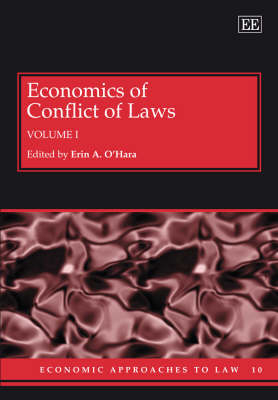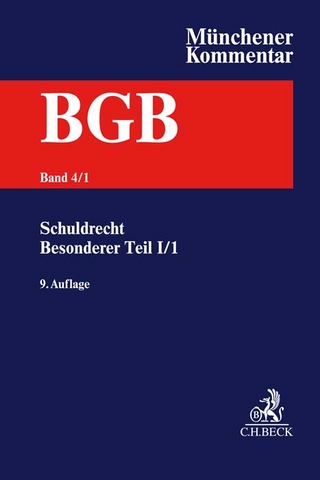
Economics of Conflict of Laws
Edward Elgar Publishing Ltd (Verlag)
978-1-84720-076-1 (ISBN)
For this important collection, Professor O'Hara has selected some cutting-edge previously-published work on the application of economic analysis to the conflict of laws. This authoritative two-volume set offers theoretical and empirical insights into existing approaches to choice of law and the effects of conflicting choice-of-law approaches on judicial decision-making. It investigates several competing proposals for more efficient choice-of-law systems, including a special section on torts. Further topics include evaluations of contract clauses (including choice-of-law and choice-of-forum provisions), and the effects of party choice on jurisdictional competition by states to provide more desirable laws, with examples relating to securities regulation, bankruptcy rules, law firm rules of ethics, same-sex marriage laws and asset protection trust law. A game theoretic analysis of interstate judgment recognition is also included.These two volumes will be an extremely useful resource for students and for scholars wishing to contribute to the next generation of the economics of conflict of laws.
Edited by Erin A. O’Hara, Dean and McKenzie Professor, Florida State University, US
Contents:
Volume I
Acknowledgements
Introduction Erin O’Hara
PART IECONOMIC AND EMPIRICAL ANALYSIS OF EXISTING APPROACHES
A Theoretical Insights
1. William F. Baxter (1963), ‘Choice of Law and the Federal System’
2. Larry Kramer (1991), ‘On the Need for a Uniform Choice of Law Code’
BEmpirical Insights
3. Michael E. Solimine (2002), ‘The Law and Economics of Conflict of Laws’
4. Patrick J. Borchers (1992), ‘The Choice-of-Law Revolution: An Empirical Study’
5. Stuart E. Thiel (2000), ‘Choice of Law and the Home-Court Advantage: Evidence’
PART IIPROPOSALS FOR MORE EFFICIENT CHOICE-OF-LAW SYSTEMS
AAlternative Efficiency-based Approaches to Choice of Law
6. Larry Kramer (1990), ‘Rethinking Choice of Law’
7. Erin A. O’Hara and Larry E. Ribstein (2000), ‘From Politics to Efficiency in Choice of Law’
8. Andrew T. Guzman (2002), ‘Choice of Law: New Foundations’
9. Erin Ann O’Hara (2002), ‘Economics, Public Choice, and the Perennial Conflict of Laws’
10. Paul B. Stephan (2002), ‘The Political Economy of Choice of Law’
11. Andrew T. Guzman (2002), ‘Public Choice and International Regulatory Competition’
BChoice of Law for Torts
12. Bruce L. Hay (1992), ‘Conflicts of Law and State Competition in the Product Liability System’
13. Michael J. Whincop and Mary Keyes (1999), ‘The Market Tort in Private International Law’
14. Michael Whincop and Mary Keyes (1998), ‘Economic Analysis of Conflict of Laws in Torts Cases: Discrete and Relational Torts’
Name Index
Volume II
Acknowledgements
An introduction by the editor to both volumes appears in Volume I
PART ICHOICE OF LAW AND FORUM PROVISIONS
AChoice-of-Law Clauses
1. Paul B. Stephan (2000), ‘Choice of Law and its Consequences: Constitutions for International Transactions’
2. Michael J. Whincop and Mary E. Keyes (1998), ‘Statutes’ Domains in Private International Law: An Economic Theory of the Limits of Mandatory Rules’
3. Erin Ann O’Hara (2000), ‘Opting Out of Regulation: A Public Choice Analysis of Contractual Choice of Law’
4. Larry E. Ribstein (2003), ‘From Efficiency to Politics in Contractual Choice of Law’
BChoice-of-Forum Provisions
5. Erin Ann O’Hara (2002), ‘The Jurisprudence and Politics of Forum-Selection Clauses’
PART IICHOICE OF LAW AND JURISDICTIONAL COMPETITON
ASecurities Regulation
6. Roberta Romano (1998), ‘Empowering Investors: A Market Approach to Securities Regulation’
BBankruptcy Rules and Courts
7. Robert K. Rasmussen (2000), ‘Resolving Transnational Insolvencies through Private Ordering’
CLaw Firm Rules of Ethics
8. Larry E. Ribstein (2001), ‘Ethical Rules, Law Firm Structure and Choice of Law’
DSame-Sex Marriage
9. F.H. Buckley and Larry E. Ribstein (2001), ‘Calling a Truce in the Marriage Wars’
EAsset-Protection Trusts
10. Stewart E. Sterk (2000), ‘Asset Protection Trusts: Trust Law’s Race to the Bottom?’
PART IIIJUDGMENT RECOGNITION AND CHOICE OF LAW
11. Michael Whincop (1999), ‘The Recognition Scene: Game Theoretic Issues in the Recognition of Foreign Judgments’
Name Index
| Erscheint lt. Verlag | 28.8.2007 |
|---|---|
| Reihe/Serie | Economic Approaches to Law series |
| Verlagsort | Cheltenham |
| Sprache | englisch |
| Maße | 169 x 244 mm |
| Themenwelt | Recht / Steuern ► EU / Internationales Recht |
| Recht / Steuern ► Privatrecht / Bürgerliches Recht ► Internationales Privatrecht | |
| Wirtschaft ► Allgemeines / Lexika | |
| Wirtschaft ► Volkswirtschaftslehre | |
| ISBN-10 | 1-84720-076-1 / 1847200761 |
| ISBN-13 | 978-1-84720-076-1 / 9781847200761 |
| Zustand | Neuware |
| Haben Sie eine Frage zum Produkt? |
aus dem Bereich


